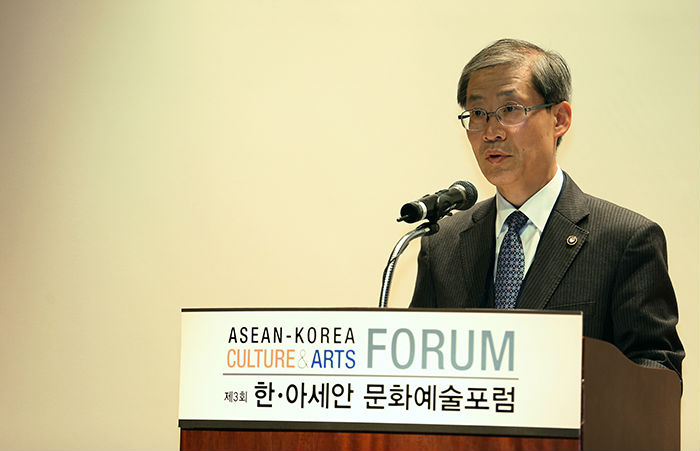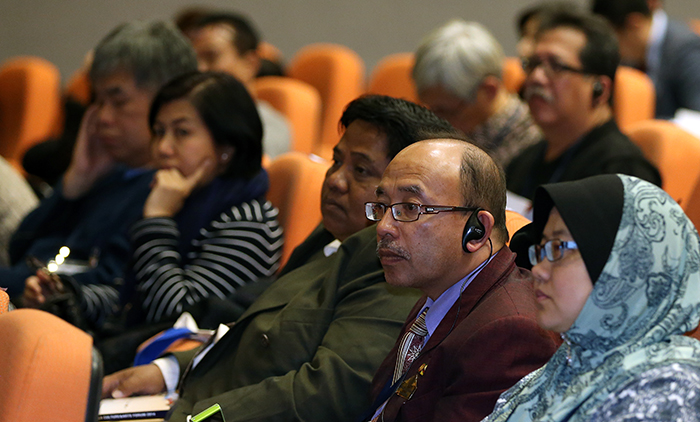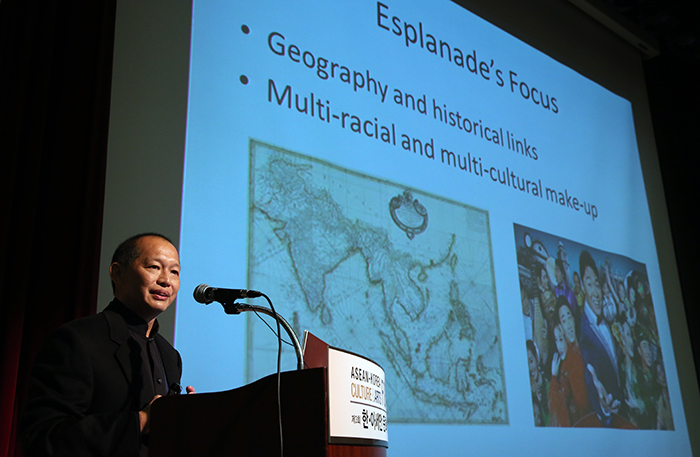A forum on cultural and arts exchanges across Asia was held in Seoul recently. Staffers and influential figures in the culture and arts sectors from the Association of South-East Asian Nations (ASEAN), including Singapore, Indonesia, Malaysia, Thailand, Vietnam, Cambodia and the Philippines, gathered for the ASEAN-Korea Culture & Arts Forum held at the National Museum of Korea.
Vice Minister of Culture, Sports and Tourism Cho Hyun-jae said in the opening speech, “This forum will provide a great opportunity to listen to the vivid voices of the active professionals in the areas of culture and arts, and allow us to share experiences and knowledge with each other. Each country will be able to further their own cultural originality and, at the same time, put collaborative projects into practice.”
Vice Minister Cho said that Asian countries have long cultivated their respective history and cultural traditions. “About a century ago, we might have had less confidence in ourselves in the face of the aggressive offensives by Western culture, but we are now rediscovering values in ourselves, as well as beginning to create new possibilities through cultural exchanges and cooperation.” He added that Korea will continue to extend its full support to help realize the forum’s goals of achieving better communication and more exchanges in culture and the arts amongst Asian countries.”

President of the Korea Arts Management Service Jung Jaewal said in his keynote address that the purpose of the forum is, ”To share insights regarding the diverse environment of and issues related to culture and the arts emerging from our various countries, and to establish a proper vision for the future so that we can build lasting partnerships and friendships.” To this aim, Jung emphasized the importance of uninhibited conversation amongst the representatives.
“I think the key is to recognize differences while also seeking out what we have in common,” Jung said. He urged that Asian countries need to discover or confirm the existence of common elements in order to broaden common understanding so that they can proceed to discuss differences and identify solutions. “If we follow this process with persistence and patience, I am confident that we will serve as the catalyst to form a strong solidarity across East Asia through our culture and art. We will help usher in the greatly anticipated ‘Era of East Asia’,” he added.


In his presentation titled, “Focus on Asia,” the CEO of Singaporean arts company The Esplanade, Benson Puah, outlined the multicultural and multiracial culture of Singapore that developed due to the country’s geographic and historic background as a trading port. He said that the country’s links to the Chinese, Indian, Malay, Arab and European civilizations form key strands of the fabric of Singaporean society and its culture. “The willingness and openness for cultural exchange are a natural consequence of our make-up,” he said.
The Esplanade is one of the most famous culture and arts facilities in Singapore. The durian-shaped building is also known as one of the landmarks of the country. More than 300 performances are staged in the theater every year. Recently, it had an epic theater production from Taiwan, a modernized Yue Opera performance from China and indie musicians from Hong Kong during the Huayi Chinese Festival of Arts. “These festivals are never inward looking or insular, but are a good representation of the respective diaspora,” said the Esplanade CEO. He explained that the Esplanade presents a wide range of performances across Asia and develops new works while pursuing its goals. The company aims to present high-quality artistic productions, develop audiences and the arts, find transformational art forms or traditions that may be inspirational to artists or audiences and boost community engagement in order to entertain and bring together all the separate communities.
At the forum in Seoul, representatives introduced cases of cultural exchange and diplomatic cooperation between Malaysia and Indonesia. Malaysian Deputy Director General of the Ministry of Tourism and Culture Mohamad Razy Mohd Nor said that both countries agreed on the importance of maintaining a good relationship between the two states, which will inculcate understanding, acceptance and tolerance amongst the people in order to maintain peace and harmony. “Malaysia would like to rekindle our commitment to strengthen the ties of friendship and cooperation that have existed between Malaysia and Indonesia,” said the Malay official. “Recently, all cultural elements that overlap both countries were disputed, but Malaysia has made a clear decision to not claim that the items belong to only Malaysia.”
The ASEAN-Korea Culture & Arts Forum was formed as a follow-up measure to the ASEAN-Republic of Korea Commemorative Summit 2009. It was designed to build trust and enhance cooperation amongst ASEAN members and Korea through cultural exchanges and cooperation.
By Yoon Sojung
Korea.net Staff Writer
arete@korea.kr
Vice Minister of Culture, Sports and Tourism Cho Hyun-jae said in the opening speech, “This forum will provide a great opportunity to listen to the vivid voices of the active professionals in the areas of culture and arts, and allow us to share experiences and knowledge with each other. Each country will be able to further their own cultural originality and, at the same time, put collaborative projects into practice.”
Vice Minister Cho said that Asian countries have long cultivated their respective history and cultural traditions. “About a century ago, we might have had less confidence in ourselves in the face of the aggressive offensives by Western culture, but we are now rediscovering values in ourselves, as well as beginning to create new possibilities through cultural exchanges and cooperation.” He added that Korea will continue to extend its full support to help realize the forum’s goals of achieving better communication and more exchanges in culture and the arts amongst Asian countries.”

Vice Minister of Culture, Sports and Tourism Cho Hyun-jae delivers the opening speech at the ASEAN-Korea Culture & Arts Forum held at the National Museum of Korea on February 26. (photo: Jeon Han)
President of the Korea Arts Management Service Jung Jaewal said in his keynote address that the purpose of the forum is, ”To share insights regarding the diverse environment of and issues related to culture and the arts emerging from our various countries, and to establish a proper vision for the future so that we can build lasting partnerships and friendships.” To this aim, Jung emphasized the importance of uninhibited conversation amongst the representatives.
“I think the key is to recognize differences while also seeking out what we have in common,” Jung said. He urged that Asian countries need to discover or confirm the existence of common elements in order to broaden common understanding so that they can proceed to discuss differences and identify solutions. “If we follow this process with persistence and patience, I am confident that we will serve as the catalyst to form a strong solidarity across East Asia through our culture and art. We will help usher in the greatly anticipated ‘Era of East Asia’,” he added.

Participants in the ASEAN-Korea Culture & Arts Forum listen to speeches by forum presenters. (photo: Jeon Han)

CEO of The Esplanade Benson Puah presents his views on cultural exchange in Singapore during the ASEAN-Korea Culture & Arts Forum. (photo: Jeon Han)
In his presentation titled, “Focus on Asia,” the CEO of Singaporean arts company The Esplanade, Benson Puah, outlined the multicultural and multiracial culture of Singapore that developed due to the country’s geographic and historic background as a trading port. He said that the country’s links to the Chinese, Indian, Malay, Arab and European civilizations form key strands of the fabric of Singaporean society and its culture. “The willingness and openness for cultural exchange are a natural consequence of our make-up,” he said.
The Esplanade is one of the most famous culture and arts facilities in Singapore. The durian-shaped building is also known as one of the landmarks of the country. More than 300 performances are staged in the theater every year. Recently, it had an epic theater production from Taiwan, a modernized Yue Opera performance from China and indie musicians from Hong Kong during the Huayi Chinese Festival of Arts. “These festivals are never inward looking or insular, but are a good representation of the respective diaspora,” said the Esplanade CEO. He explained that the Esplanade presents a wide range of performances across Asia and develops new works while pursuing its goals. The company aims to present high-quality artistic productions, develop audiences and the arts, find transformational art forms or traditions that may be inspirational to artists or audiences and boost community engagement in order to entertain and bring together all the separate communities.
At the forum in Seoul, representatives introduced cases of cultural exchange and diplomatic cooperation between Malaysia and Indonesia. Malaysian Deputy Director General of the Ministry of Tourism and Culture Mohamad Razy Mohd Nor said that both countries agreed on the importance of maintaining a good relationship between the two states, which will inculcate understanding, acceptance and tolerance amongst the people in order to maintain peace and harmony. “Malaysia would like to rekindle our commitment to strengthen the ties of friendship and cooperation that have existed between Malaysia and Indonesia,” said the Malay official. “Recently, all cultural elements that overlap both countries were disputed, but Malaysia has made a clear decision to not claim that the items belong to only Malaysia.”
The ASEAN-Korea Culture & Arts Forum was formed as a follow-up measure to the ASEAN-Republic of Korea Commemorative Summit 2009. It was designed to build trust and enhance cooperation amongst ASEAN members and Korea through cultural exchanges and cooperation.
By Yoon Sojung
Korea.net Staff Writer
arete@korea.kr